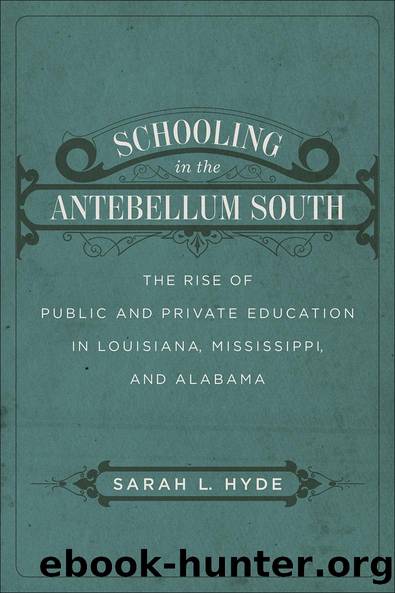Schooling in the Antebellum South by Sarah L. Hyde

Author:Sarah L. Hyde [Hyde, Sarah L.]
Language: eng
Format: epub
Tags: History, United States, State & Local, South (AL; AR; FL; GA; KY; LA; MS; NC; SC; TN; VA; WV), Education, General
ISBN: 9780807164228
Google: dYocDAAAQBAJ
Publisher: LSU Press
Published: 2016-10-19T22:10:35+00:00
As in Louisiana, the same time period in Mississippi witnessed new agitation on behalf of public education. Throughout the 1840s, Mississippi governors lobbied the legislature to take action to spread free schools across the state. Unlike in Louisiana, Mississippi did not need the impetus from a new constitution to spark the state governmentâs actions on public schools; Mississippiâs original constitution mandated state support of education. In 1840 Governor Alexander G. McNutt reminded the stateâs legislators of that provision, imploring them, âI again call your attention to that clause of the Constitution which enjoins upon us the encouragement of schools, and requires us to provide the means of education.â McNutt served as an important lobbyist in favor of school reform. He carefully studied the condition of schools in the state and sent out circulars to the presidents of all the schools engaging them on the current education situation as well as their suggestions for reform. From their responses, which he passed on to the legislature, he concluded, âThe correspondence satisfactorily establishes the fact, that education can be afforded as cheap in this State as elsewhere.â The governor then called the legislatorsâ attention to the revised statutes prepared by General P. Rutilius R. Pray. There Pray offered a plan for a âcomplete system of public instruction in free schools, academies, colleges and in a State University,â based on the experience of other states. Most importantly, according to McNutt, Pray pointed out the necessity for an annual tax to support the schools. While opposition to increased taxation was expected, the governor insisted that the value of an educated populace would benefit the entire state, even those with no children or who preferred to patronize private schools.15
McNuttâs pleas nonetheless went unheeded. In 1844 his successor, Tilghman Tucker, prodded the legislature to take action to establish free schools across the state. Tucker chided the legislators for failing to do more for education earlier, despite the arrangements put in place by the federal government to use sixteenth section lands to support schools. He argued that âthe legislature has heretofore entrusted this important subject to the management and to the voluntary contributions of the citizens of the state.â Tucker called on politicians to end their neglect of education and to lend it their pecuniary support in order to establish a system of schools across the state. The governor suggested the organization of a free primary school in every township with a new tax to support the schools for a minimum of six months each year. It is interesting that Tucker chose to use his last address to the legislature as governor to lobby so passionately for schools: âAlthough the suggestion may be considered rash, even indiscreet, by some, yet as this message will in all probability, be the last official act which I shall have the honor to perform in the legislative councils of the state, I feel under the most sacred obligations to present the subject [of public education], so as not to be misunderstood, and to urge its consummation.
Download
This site does not store any files on its server. We only index and link to content provided by other sites. Please contact the content providers to delete copyright contents if any and email us, we'll remove relevant links or contents immediately.
In Cold Blood by Truman Capote(3374)
The Innovators: How a Group of Hackers, Geniuses, and Geeks Created the Digital Revolution by Walter Isaacson(3136)
Steve Jobs by Walter Isaacson(2888)
All the President's Men by Carl Bernstein & Bob Woodward(2362)
Lonely Planet New York City by Lonely Planet(2213)
And the Band Played On by Randy Shilts(2188)
The Room Where It Happened by John Bolton;(2150)
The Poisoner's Handbook by Deborah Blum(2129)
The Innovators by Walter Isaacson(2096)
The Murder of Marilyn Monroe by Jay Margolis(2092)
Lincoln by David Herbert Donald(1981)
A Colony in a Nation by Chris Hayes(1926)
Being George Washington by Beck Glenn(1901)
Under the Banner of Heaven: A Story of Violent Faith by Jon Krakauer(1788)
Amelia Earhart by Doris L. Rich(1685)
The Unsettlers by Mark Sundeen(1682)
Dirt by Bill Buford(1669)
Birdmen by Lawrence Goldstone(1660)
Zeitoun by Dave Eggers(1643)
